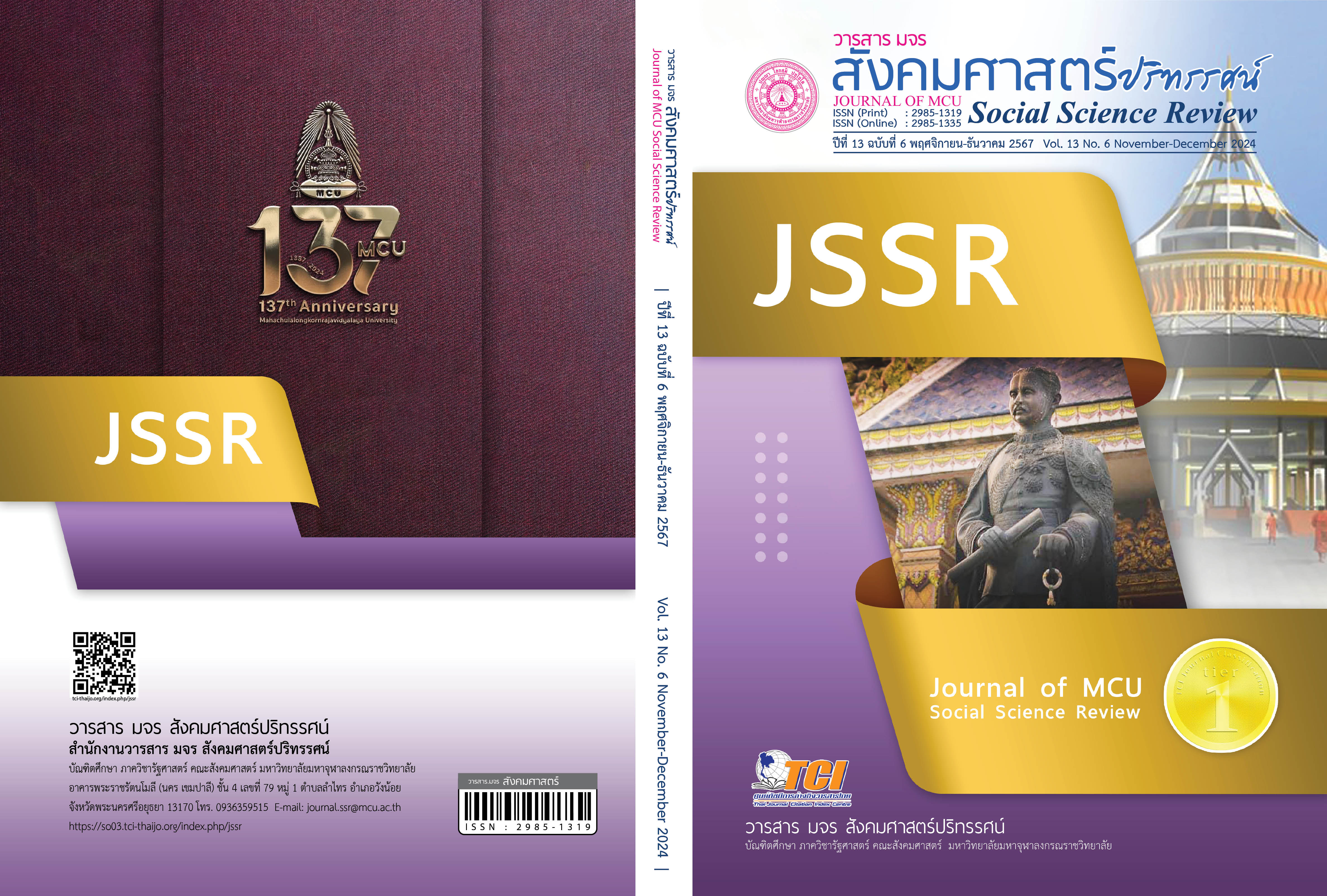ร้านรีฟีล: การค้าปลีกที่ยั่งยืนบนแนวคิดขยะเหลือศูนย์ (Zero Waste)
คำสำคัญ:
ร้านรีฟีล, แนวคิดขยะเหลือศูนย์, เศรษฐกิจหมุนเวียน, ปัญหาสิ่งแวดล้อมบทคัดย่อ
บทความวิชาการนี้มีวัตถุประสงค์เพื่อศึกษาลักษณะของร้านรีฟีลและนำเสนอแนวทางพัฒนาที่จะนำไปสู่การขับเคลื่อนอย่างยั่งยืน จากผลกระทบจากสถานการณ์การแพร่ระบาดของไวรัสโควิด-19 ทําให้ปริมาณการใช้บรรจุภัณฑ์จากร้านค้าปลีกเพิ่มสูงขึ้นอย่างมาก ส่งผลให้เกิดขยะบรรจุภัณฑ์แบบใช้ครั้งเดียวสูงขึ้น การค้าปลีกในปัจจุบันจึงมีบทบาทสำคัญในการผลักดันการบริโภคและก่อให้เกิดปัญหาด้านสิ่งแวดล้อมจากขยะบรรจุภัณฑ์ร้านรีฟีล (Refill Stores) ถือเป็นร้านค้าปลีกรูปแบบใหม่ที่เกิดขึ้นจากกระแสตื่นตัว ด้านสิ่งแวดล้อมในปัจจุบัน ซึ่งถือเป็นรูปแบบของการค้าปลีกอย่างยั่งยืน (Sustainable Retail) ที่สนับสนุนการใช้บรรจุภัณฑ์ซ้ำและลดการใช้บรรจุภัณฑ์ครั้งเดียวทิ้ง โดยผู้บริโภคสามารถนำบรรจุภัณฑ์มาเพื่อเติมสินค้าเองและคิดราคาตามน้ำหนักของสินค้า ลักษณะของร้านรีฟีลนั้นสอดคล้องกับแนวคิดขยะเหลือศูนย์ (Zero Waste) ซึ่งเป็นแนวคิดที่ส่งเสริมการหมุนเวียนทรัพยากรให้กลับมาใช้ใหม่เพื่อเป็นการใช้ทรัพยากรอย่างมีประสิทธิภาพสูงสุด ลดปริมาณขยะให้เหลือน้อยที่สุดหรือไม่สร้างขยะให้เกิดขึ้นเลยตั้งแต่ต้นทาง ซึ่งสอดคล้องกับลักษณะของร้านรีฟีลที่ส่งเสริมการลดขยะที่เกิดขึ้นจากการบริโภคในชีวิตประจำวัน โดยส่งเสริมให้ผู้บริโภคซื้อสินค้าไร้บรรจุภัณฑ์ และปรับเปลี่ยนพฤติกรรมการใช้ชีวิตให้สอดคล้องกับแนวคิดขยะเหลือศูนย์ (Zero Waste) และเศรษฐกิจหมุนเวียน (Circular Economy)
เอกสารอ้างอิง
กรมควบคุมมลพิษ. (2563). คู่มือการออกแบบบรรจุภัณฑ์เพื่อสิ่งแวดล้อม (Manual for Eco Design Packaging). สืบค้น 1 มิถุนายน 2566, จาก https://shorturl.asia/tRWkD
พิมพ์พรรณ เดือนแจ่ม และสิทธิเดช พงศ์กิจวรสิน. (2564). อนาคตของตลาดสินค้าไร้บรรจุภัณฑ์ในประเทศไทย-ทำอย่างไรถึงจะได้ไปต่อ. วารสารสิ่งแวดล้อม, 25(1), 1-10.
ลุงซาเล้งกับขยะที่หายไป. (2563). รวมร้านปลอดขยะทั่วฟ้าเมืองไทย. สืบค้น 5 มิถุนายน 2566, จาก https://shorturl.asia/guYdV
ศูนย์วิจัยกสิกรไทย. (2562). SME จับเทรนด์รักษ์โลก เร่งสร้างเม็ดเงิน. สืบค้น 8 มิถุนายน 2566, จาก https://shorturl.asia/fXhoe
สถาบันวิจัยสภาวะแวดล้อม จุฬาลงกรณ์มหาวิทยาลัย. (2565). รายงานฉบับสมบูรณ์ โครงการพัฒนากรอบนโยบายการจัดการขยะบรรจุภัณฑ์ในประเทศไทยด้วยหลักการ EPR. สืบค้น 27 กันยายน 2566, จาก https://www.pcd.go.th/publication/23187
สมาคมพัฒนาคุณภาพสิ่งแวดล้อม. (ม.ป.ป.). ZERO WASTE ขยะเหลือศูนย์ เป็นจริงได้ไม่ใช่แค่ฝัน. สืบค้น 5 มิถุนายน 2566, จาก https://adeq.or.th/zero-waste-
สำนักงานพัฒนาการวิจัยการเกษตร (องค์การมหาชน). (ม.ป.ป.). ทำความรู้จัก Zero Waste คืออะไร ทำไมถึงต้องให้ความสำคัญ. สืบค้น 10 มิถุนายน 2566, จาก https://www.arda.or.th/knowledge_detail.php?id=78
สุภัชญา เตชะชูเชิด. (2564). กว่าจะมาเป็น Refill Station ร้านค้าแบบเติมแห่งแรกของไทย เมื่อธุรกิจช่วยให้โลกน่าอยู่ขึ้น. สืบค้น 12 มิถุนายน 2566, จาก https://shorturl.asia/jETfI
โอฬาร กีรติกุลธร. (2563). การศึกษาความใส่ใจสิ่งแวดล้อมและข้อจำกัดกับความตั้งใจซื้อสินค้าในร้าน Bulk Store ของผู้บริโภคในกรุงเทพมหานคร. ปทุมธานี: มหาวิทยาลัยธรรมศาสตร์.
Baki, O. G. & Ergun, O. N. (2021). Municipal Solid Waste Management: Circular Economy Evaluation in Turkey. Environmental Management and Sustainable Development, 10(2), 79-92.
Beitzen-Heineke, E. F., et al. (2017). The prospects of zero-packaging grocery stores to improve the social and environmental impacts of the food supply chain. Journal of Cleaner Production, 140(1), 1528-1541.
Bocken, N. M. P. & Short, S. W. (2021). Unsustainable business models-Recognising and resolving institutionalised social and environmental harm. Journal of Cleaner Production, 312(1), 127828-127942.
Bulk Barn. (2019). Bulk Barn-Our Story. Retrieved June 20, 2023, from https://bulkbarn.co.nz/pages/our-story
Istas, D. (2019). Expansion of the local, organic and zero-packaging food concept in three contexts: zero-packaging grocery stores, conventional supermarkets, and ecostores (Master Thesis). Netherlands: Maastricht University.
Krungsri Plearn Plearn. (n.d.). Zero Waste has begun. Modern life. Change waste to zero. Retrieved June 3, 2023, from https://www.krungsri.com/th/plearn-plearn/zero-waste-lifestyle
Lin, Y.-T. et al. (2022). A value adoption approach to sustainable consumption in retail stores. International Journal of Retail & Distribution Management, 50(11), 1412-1435.
PTT Group Sharings. (2021). Zero Waste, a guideline for reducing waste to zero. Retrieved June 20, 2023, from https://pttgrouprayong.com/newsroom/ptt-group-sharings/99/zero-waste-
Refill Station. (n.d.). About Us. Retrieved June 11, 2023, from https://www.refillstationbkk.com/
Russell, S. (2023). What are Zero-Waste Grocery Stores?. Retrieved June 22, 2023, from https://environment.co/zero-waste-grocery-stores/
Saladino, G. (2018). The packaging-free grocery stores phenomenon in Italy: key characteristics, drivers and barriers A sustainable entrepreneurship perspective (Master Thesis). Netherlands: Utrecht University.
TedxTeen. (n.d.). Why I Live a Zero Waste Life - Lauren Singer. Retrieved June 20, 2023, from https://www.tedxteen.com/talks/why-i-live-a-zero-waste-life-lauren-singer
Thornton, A. (2020). 7 Ways Packaging Is Changing To Reduce Plastic Waste. Retrieved June 20, 2023, from https://shorturl.asia/UeV1C
Wei, J. (2021). Lauren Singer: How an Influencer Turned a Mason Jar into a Movement. Retrieved June 20, 2023, from https://shorturl.asia/ocDFt
Zero Waste International Alliance. (2018). Zero Waste Definition. Retrieved June 8, 2023, from https://zwia.org/zero-waste-definition/
ดาวน์โหลด
เผยแพร่แล้ว
รูปแบบการอ้างอิง
ฉบับ
ประเภทบทความ
สัญญาอนุญาต
ลิขสิทธิ์ (c) 2024 วารสาร มจร สังคมศาสตร์ปริทรรศน์

อนุญาตภายใต้เงื่อนไข Creative Commons Attribution-NonCommercial-NoDerivatives 4.0 International License.
เพื่อให้เป็นไปตามกฎหมายลิขสิทธิ์ ผู้นิพนธ์ทุกท่านต้องลงลายมือชื่อในแบบฟอร์มใบมอบลิขสิทธิ์บทความให้แก่วารสารฯ พร้อมกับบทความต้นฉบับที่ได้แก้ไขครั้งสุดท้าย นอกจากนี้ ผู้นิพนธ์ทุกท่านต้องยืนยันว่าบทความต้นฉบับที่ส่งมาตีพิมพ์นั้น ได้ส่งมาตีพิมพ์เฉพาะในวารสาร มจร สังคมศาสตร์ปริทรรศน์ เพียงแห่งเดียวเท่านั้น หากมีการใช้ภาพหรือตารางหรือเนื้อหาอื่นๆ ของผู้นิพนธ์อื่นที่ปรากฏในสิ่งตีพิมพ์อื่นมาแล้ว ผู้นิพนธ์ต้องขออนุญาตเจ้าของลิขสิทธิ์ก่อน พร้อมทั้งแสดงหนังสือที่ได้รับการยินยอมต่อบรรณาธิการ ก่อนที่บทความจะได้รับการตีพิมพ์ หากไม่เป็นไปตามข้อกำหนดเบื้องต้น ทางวารสารจะถอดบทความของท่านออกโดยไม่มีข้อยกเว้นใดๆ ทั้งสิ้น





